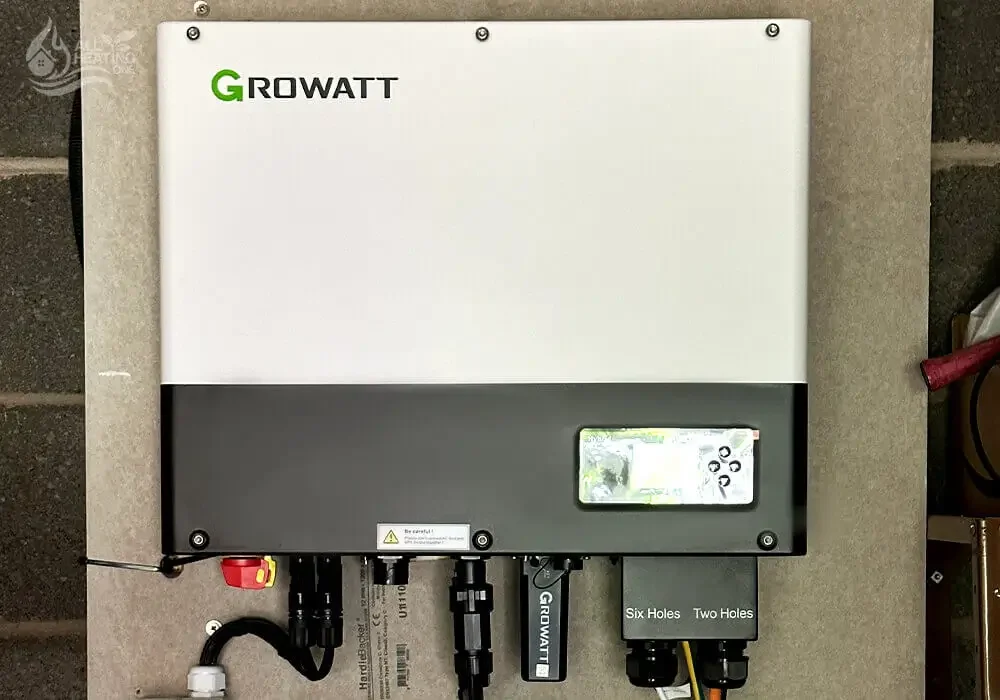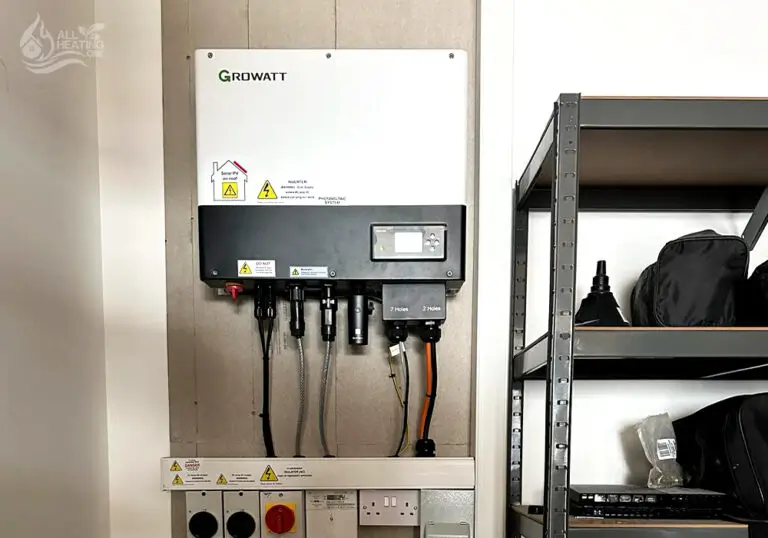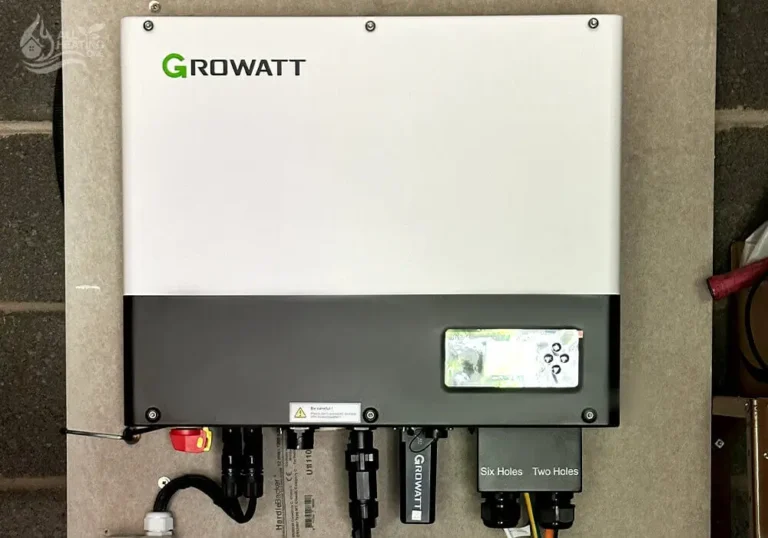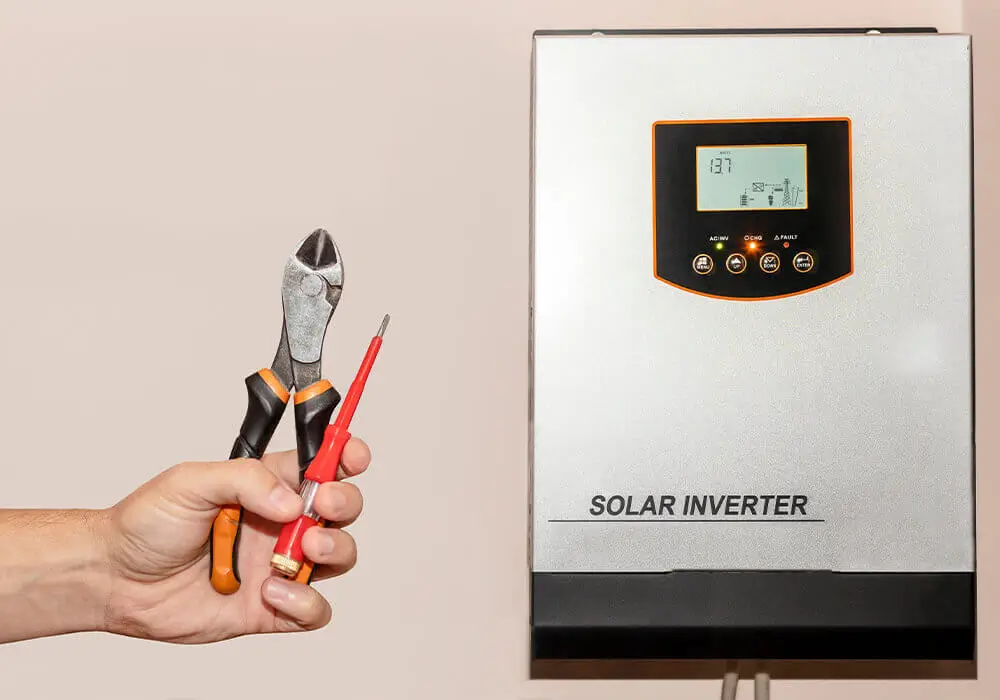Solar panel inverter
Install the solar panel inverter and boost the utility of your solar setup. The inverters for solar panels are pivotal for converting the direct current (DC) into alternating current (AC), to power the heating systems. The significance of solar panel inverters is beyond just functionality, as they are also useful to ensure the efficiency and effectiveness of solar photovoltaic (PV) systems as well.
The inverter for solar panels emerges as an essential component that elevates the efficacy and allure of solar-powered heating solutions. So, by highlighting various benefits of inverters for solar panels, we will discuss their appeal to customers, emphasizing key selling points for making informed decisions regarding solar energy adoption.
Get a free quote from us today!
We will get back to you within 24 hours

Understanding Solar Panel Inverters.
With the increasing volume of solar panel installation in the UK, the demand for solar panel inverters also jumps up due to the noticeable shift in consumers’ reliance from fossil fuel to renewable energy solutions. Among these solutions, the solar photovoltaic (PV) panel is on the top of the list that generates electricity by direct sunlight. In this process, the inverter for solar panels plays a vital role as a cost-efficient companion of solar power setups, promising reduced energy bills.
Besides, the solar panel inverter contains important safety shutdown electronics such as Anti-Islanding Protection. As a result, it also opens the door to more opportunities of selling the surplus electricity back to the national grid offered in the form of eco-friendly initiatives like Smart Export Guarantee.
Types of solar panel inverter we offer

Hybrid Solar Panel Inverter
One of the recent innovations in the domain of solar panel technology is the Multi-mode inverter, commonly called the Hybrid Solar Panel System. It is a combination of a traditional solar water heating system and the novel PV technology that enables the homeowners in the UK to add batteries to their solar power system. The hybrid solar panel inverter functions on the basis of the DC coupling technique that coordinates the charging and discharging of the battery.
Such innovative solutions incorporate inverters for solar panels to maximize energy production and utilization by transforming solar energy into electricity along with facilitating water heating.
By leveraging the capabilities of solar panel inverters within hybrid systems, the consumers in the UK can optimize their energy independence while contributing to the broader transition towards sustainable energy sources
Grid Tied Inverter

The Grid tied inverter is designed with a distinct feature that uses the grid as a voltage, frequency, and phase reference, without having batteries. It also takes all the energy available from the PV array to send it to the grid, ensuring you get the most out of your solar investment.
Grid tied inverters are equipped with smart monitoring capabilities, allowing you to track your system’s performance in real-time and optimal operations. In an on-grid solar power system, the utility grid acts as a virtual battery and all stored power from the solar inverter is converted into power credits. The solar panel inverter uses these credits to take clean energy from utility providers via bi-directional meters when needed without actually paying for it. If by the month’s end, solar credits are not exhausted, they will be adjusted in the monthly electricity bills.
Moreover, these inverters have multiple layers of protection, including anti-islanding for grid safety that ensures a safe and reliable connection at all times.


Off Grid Inverter
The off-grid inverter is one of the core components of a solar panel system. The main task of the off-grid inverter is to convert the direct current power generated by the solar panels into alternating current power for use by household appliances. This is a type of solar panel inverter that cannot be connected to the grid thus also called a stand-alone inverter. These inverters are unable to transfer power but can store the energy as these are connected to battery banks.
The off-grid solar inverter functions as a two-way device that draws energy from the battery, transforms it from DC to AC, and then outputs it as AC. This process usually involves the use of a technique called maximum power point tracking (MPPT) to ensure maximum electrical output from the solar panels. The off-grid inverters typically have data communication interfaces that allow for system monitoring and remote control. These interfaces can be integrated to a monitoring system or the Internet via wireless technology or a wired connection.
Despite having no connection to the grid, the off-grid inverter can be used to create the grid in the hybrid solar panel system. Then, to run most or all of the electricity, utilize a grid-tied inverter.
Fast and Free no-obligation cleaning quotation.
Our Portfolio
- High Efficiency
- Monitoring and Control
- Grid interaction
- Backup Power
- Facility of Energy Storage
- Durability and Reliability
High Efficiency
Modern solar panel inverters have high efficiency in converting DC electricity from solar panels into usable AC electricity, minimizing energy losses to a great extent.
Monitoring and Control
Many inverters come with built-in monitoring and control capabilities, allowing users to track the performance of their solar panels in real-time, and to monitor energy production.
Grid interaction
Grid-tied inverters for solar panels enable the overall solar setup to be combined with the electrical grid, allowing users to sell excess electricity back to the grid through net metering programs.
Backup Power
Some solar inverters are equipped with backup power capabilities, allowing consumers to provide electricity to critical loads during grid outages or emergencies that enhances energy resilience and reliability.
Facility of Energy Storage
Solar panel inverters can be integrated with battery storage systems to reserve excess solar energy for later use, enabling consumers to further optimize energy consumption, increase self-consumption, and reduce reliance on the grid
Durability and Reliability
The high-quality solar panels inverters are built to withstand harsh environmental conditions and typically come with long warranties that ensure reliable operations and longevity of the solar power system.
We are a trusted, regulated and MCS accredited company in Scotland (UK)







FREQUENTLY ASKED QUESTION
How does a solar panel inverter work?
As the solar panels generate DC electricity which is converted into AC electricity by a solar inverter. So the solar panel inverter works as an intermediary component between the solar panel and electronic appliances used at the installation place.
How does a solar panel inverter affect costs and savings?
A solar panel inverter reduces the operating cost of a solar panel due to its capability of storing power to be used when it is needed. Some inverters also have the feature of automatically shutting down energy generation once the sufficient amount is produced. Besides cost-cutting, if the solar panel generates excessive electricity, then users may sell the surplused portion to national girds.
What type of solar inverter is best for a solar panel system?
It totally depends upon your usage and objective of setting up a solar plant. An off-grid solar inverter can save you altogether from an electricity bill, making your solar panel system self-sufficient without being tied to a utility grid. However, it is wiser to opt for on-grid solar power systems and inverters because the utility grid offers you a power backup, plus you can enjoy subsidies offered by the government.
Can you run a solar inverter without solar battery storage?
Yes, definitely. There are some specific kinds of solar inverters that can be run without solar battery storage such as on-grid inverters, but it is so when the inverter is connected to the utility grid.
